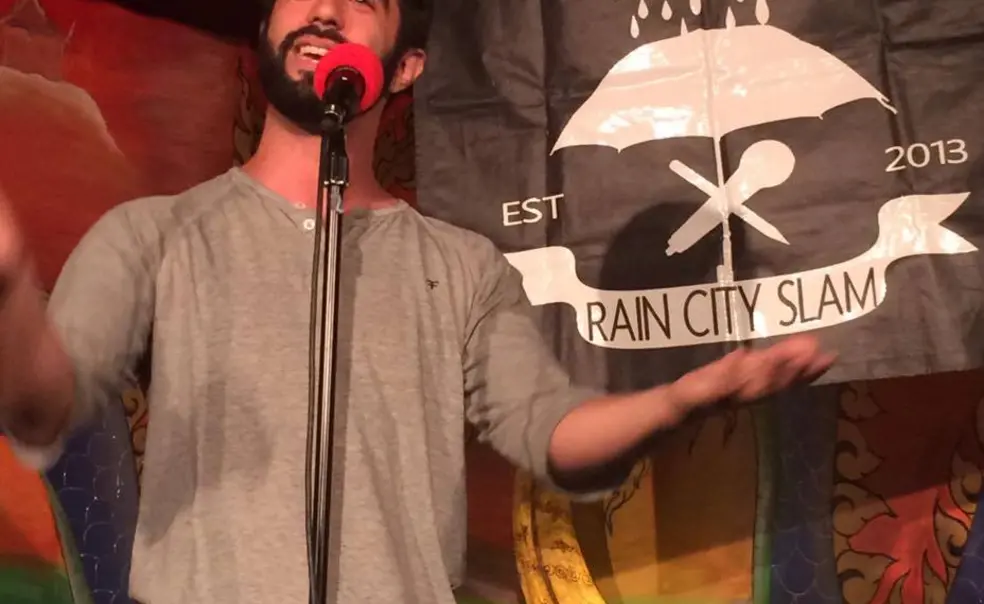Ian Martinez ’01, Poetry Slam Champion
Fifteen blocks. That’s how far Puerto Rican spoken word poet Ian Martinez ’01 walks every Wednesday, blasting his pump-up playlist through his headphones.
For Martinez, it’s not just a walk through Seattle. It’s a step away from his “white-collar job” at Microsoft, and a step towards the microphone on the intense-yet-intimate stage at Jai Thai on Broadway, home of the Rain City Poetry Slam.
Though he considers himself to be a “real newcomer and rookie,” Martinez is the current Grand Champion of the Rain City Poetry Slam. He earned that title by winning the Rain City slam’s finals in April, which attracted 250 people.
“Spoken word is a unique art form because it combines storytelling, traditional verse, and wordplay,” Martinez says. “Your energy has to match the room’s, and then take it up a notch. If you deliver, and the room gives you back the love you put into the poem, that’s the greatest feeling an artist can have.”
In Atlanta, Ga., this August, Martinez will compete in the National Poetry Slam with Rain City’s slam team. He also frequently emcees slams; last year, he was voted onto Rain City’s board.
The rules of slam are simple: Each poet performs an original poem on stage, and five randomly-selected members of the audience judge the poem on a 0-to-10 scale. No props are allowed, and each poet has exactly three minutes (or less) to slam. According to Poetry Slam International, the format was invented in Chicago by a construction-worker-turned-poet, Marc Smith, in the late ’80s.
A poetry slam demands the focus of a high-energy competition — yet, Martinez says, it’s also a supportive environment that requires vulnerability to succeed.
“We’re in a space where people are telling their stories in the context of the larger world,” he says. “There can be a lot of apprehension about your voice, and whether your choices will connect to community you’re stepping into.”
Martinez first stepped in front of the mic at Jai Thai in the fall of 2014, six months after attending his first slam. On the finals stage in April, Martinez performed “Sabrías,” which is available on YouTube. The poem describes an encounter Martinez had with a “Puerto Rican nationalist.”
Sabrías si hablabas español mejor.
He tells me, You would know if you spoke better Spanish.
You would know if you weren’t imprisoned in a colonizer’s tongue.
And I know what he’s calling me when he says this.
How, If you spoke better Spanish translates to
If you were a better Puerto Rican.
Martinez was born and raised in New York — the son, he says, of a “single teen mother.” He graduated from Brentwood High School, a blue-collar school in a predominantly Black and Latino district.
“Princeton was a major adjustment,” he says. “I’d be lying if I said everything about the social transition into a world of dizzying privilege was easy at the time.”
At Princeton, Martinez majored in English. He later earned a master’s in English at Georgetown. He cites Thomas P. Roche — a leading Spenser scholar whom his classmates called “TPR” — as an important mentor.
Martinez says social justice is a central theme in his poetry — especially his sense of his own intersectional, or “hybrid”, identities.
His first chapbook, Hybrid Life, is a collection of 20 poems that he published before his first solo feature at the slam.
“An outsized part of my daily life tends to be about living those contradictions, so my work is too,” he says.












No responses yet